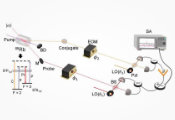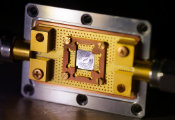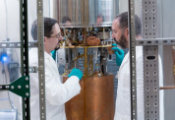Advancing European Quantum Computing: Signature of the Procurement Contract for EuroQCS-Poland
July 11, 2024 — The procurement contract of EuroQCS-Poland, the EuroHPC quantum computer to be located in Poland, has been signed by the European High Performance Computing Joint Undertaking (EuroHPC JU) and AQT, the selected vendor.
EuroQCS-Poland will be a digital, gate-based quantum computer, based on trapped-ions offering 20-plus physical qubits. The installation of the system will start in the middle of 2025.
This quantum computer will primarily target research and innovation and will be available to a wide range of European end-users, spanning from the scientific community to industry and the public sector. It will support the development of a wide range of applications with industrial, scientific and societal relevance for Europe and adding new capabilities to the European supercomputing infrastructure.
The new quantum computer will be integrated with a classical supercomputing system to enhance hybrid quantum-classical computing approaches. Consequently, new hybrid quantum-classical use cases and benchmarks will be supported, including but not limited to quantum optimization, quantum chemistry, quantum material sciences and quantum machine learning. The new system on the basis of trapped-ions will also provide several unique features that will make it attractive for end-users and applications like high fidelity qubits, long coherence times, universal quantum gates and all-to-all connectivity support.
Owned by the EuroHPC JU, the system will be hosted at the Poznan Supercomputing and Networking Center (PSNC) in Poland and integrated into the local high-performance computing (HPC) infrastructure allowing for remote access via the co-located supercomputer connected to the PIONIER NREN.
PSNC leads the EuroQCS-Poland consortium, which consists of two additional Polish partners, the Center for Theoretical Physics Polish Academy of Science and Creotech Instruments S.A, and one academic partner from Latvia, the University of Latvia. PSNC is at the forefront of the initiative EuroQCS-Poland and is responsible for the full integration of hardware and software development, providing comprehensive application and user support to ensure seamless operations of the hybrid classical-quantum computing infrastructure.
The Center for Theoretical Physics PAS will play a critical role in incorporating and developing techniques for efficient characterization and error mitigation tailored to the trapped ions quantum system. Their contributions will enhance the accuracy and reliability of quantum operations.
Creotech Instruments will develop a cutting-edge subsystem to mitigate errors and enhance the performance of quantum computers. Their work will focus on low-latency classical-quantum hardware integration, a key factor in achieving high-performance quantum computing.
The University of Latvia, renowned for its pioneering work in quantum walks for designing quantum algorithms, will focus on designing and testing new quantum algorithms. Their expertise in developing methods for quantum lower bounds will be instrumental in optimizing quantum computations.
EuroQCS-Poland is co-funded with a total acquisition cost of EUR 12.28 million. The EuroHPC JU will fund 50% of the costs and the remaining 50% will be funded by the Ministry of Digital Affairs of Poland.




































